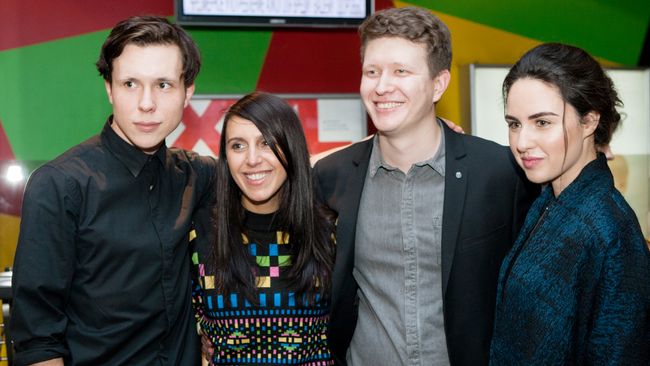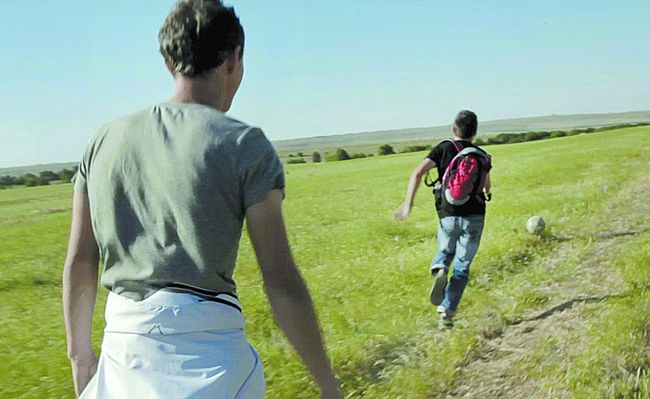“CRIMEAN STORIES”: between politics and art
Kyiv’s cinema theater Ukraina premieres a series of three films directed by a young Crimean Tatar, Nariman Aliyev
Born in Crimea in 1992, Nariman Aliyev was awarded a diploma of film director at Kyiv National Karpenko-Kary University of Theater, Cinema, and Television in 2014. He is a cofounder and manager of the feature-film program at the Contemporary Ukrainian Cinema (SUK), a nongovernmental organization of young filmmakers.
“Crimean Stories” comprise the novellas Returning at Dawn (Tan Atqanda Qaytmag, 2013), I Love You (Seni Sevem, 2014), and Without You (Sensiz, 2015). All these films, made in Crimea, mostly involve the director’s relatives and friends. Nariman does most of the work on and off the filming spot by himself: he writes scripts, shoots, and edits.
In the current situation, any event associated with the Crimean Tatar people assumes a political shade. The premiere at Ukraina was no exception – it was attended by the Crimean Tatar celebrities Jamala and Mustafa Dzhemilev as well as some of Kyiv’s leading media.
What unifies the “Crimean Stories” is the same location – the rural steppe Crimea – and dramaturgy: the three shorts are dramas about the real life of Crimean Tatars. Returning at Dawn is about a breakup between the father and the son who leaves home for a big world. I Love You is a copybook drama of an impossible love between a Crimean Tatar youth and a Slav girl. Without You, a story of brotherly love, loss, and memory, is in fact dedicated to the director’s brother. The latter film was shot in the occupied Crimea. Without You was premiered last February at the 66th Berlin International Film Festival, where it was presented at the parallel Generation 14+ competition and received quite a warm welcome from the festival audience.
All the three pictures are interesting from the viewpoint of their author’s development. While Returning at Dawn focuses on the picturesque plasticity of a scene, close-ups, and static landscapes, I Love You shows an abruptly changed rhythm of cinematography and editing: the camera moves actively, increasing the dynamics of footage. Finally, Without You, perhaps Aliyev’s most mature work, is a synthesis of the experience the director gained in the previous films.
In any case, what remains unchanged from film to film is high-skilled cinematography and flawless editing. Undoubtedly, the 24-year-old director has a future in the realm of film.
NARIMAN ALIYEV: “ABOVE ALL, I CONSIDER MYSELF A UKRAINIAN FILM DIRECTOR”
Nariman, how did you become a filmmaker?
“Rather accidentally, for I had no connections and none of my parents or relatives was in this field. Very early, at 16, I entered the Institute of Cinematic Arts (which no longer exists), studied there for four years, and received the bachelor’s degree, but I was awarded a diploma at Karpenko-Kary University. Let me note, incidentally, that we need a little different system of education, for very few people aged 16 or 17 know what to do in life and what film directing is all about. I was lucky to have good teachers, including, first of all, my artistic supervisor Oleh Fialko.”
What must a script have in order to be realized?
“The first thing is an idea – what you want to say, after all. Then you think about how to convey it as subtly as possible, without primitivism. I am always guided by this. The idea brings forth the theme and then the form, and, finally, all this builds a story.”

THE FILM WITHOUT YOU IS ABOUT BROTHERLY LOVE, LOSS, AND MEMORY
I can’t help asking what caused such a radical change of style in your second film.
“It is an attempt to discover yourself. I’d like to try out as much as possible and improve my skills by means of various techniques. The goal is to have a wide range of ‘instruments’ to film one story or another when you take up full-length movies.”
Full-length features are too high a barrier for most of our young film directors.
“Yes, it’s difficult. One should prepare in earnest. So I am not exactly rushing to carry out new projects.”
To what extent difficult was it to shoot a film in the occupied Crimea?
“We filmed in remote areas so that nobody could see us. We did our best not to create problems for us or for other people.”
In general, what can art do when politicians and society are helpless?
“Art must exist. It must inspire and tell about human woes so that our emotions do not become dull even in a situation like this. I think this is the ultimate goal.”
Obviously, you are rather unwilling to touch on political matters…
“That’s right.”
But I don’t think we can escape discussing the ways Crimean Tatar culture should develop now. The proverbial question is: what is to be done?
“This is in fact what we are doing in the SUK nongovernmental organization. We have a lot of talents to develop and help. When we manage to show them to Ukraine and the world, we will see that there are many interesting and bright things going on here. Naturally, we must not forget tragic events, but if we fixate on them, we may utterly close in and ruin ourselves from inside. From this angle, it’s difficult to overestimate the ability of art to stir up emotions. If we do not lose the ability to sympathize, we will remain humans, a nation. As a representative of my people, I consider myself, above all, a Ukrainian film director, and this gives me an opportunity to say more about my people and their traditions.”
What benefit did you derive from the Berlinale?
“It was a good experience as far as knowledge of the market, trends, contacts, and ties is concerned. The more new acquaintances from various countries you have, the better you know their films, the more new discoveries you make. We don’t know many things here, and these festivals considerably broaden your horizons. And it is up to you how to make use of this.”
What are your next plans?
“I focus more on public activism now because I think we should help our young friends realize the potential they have. For example, we are holding now a short-film contest, ‘Ukraine Is a Road to Peace,’ just in order to find gifted young people to cooperate with. We will not leave them alone. They will be taught under the auspices of the Ihor Yankovsky Foundation and given opportunities to take part in festivals. This is the No.1 task for me now. To grow further, they must have competition. You can’t possibly remain all alone.”
Newspaper output №:
№16, (2016)Section
Culture





